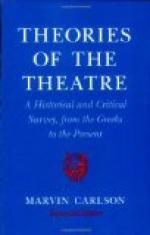But now, lest we be led into misapprehension, let us understand clearly that what we desire in the theatre is not new material, but rather a fresh and vital treatment of such material as the playwright finds made to his hand. After a certain philosophic critic had announced the startling thesis that only some thirty odd distinct dramatic situations were conceivable, Goethe and Schiller set themselves the task of tabulation, and ended by deciding that the largest conceivable number was less than twenty. It is a curious paradox of criticism that for new plays old material is best. This statement is supported historically by the fact that all the great Greek dramatists, nearly all of the Elizabethans, Corneille, Racine, Moliere, and, to a great extent, the leaders of the drama in the nineteenth century, made their plays deliberately out of narrative materials already familiar to the theatre-going public of their times. The drama, by its very nature, is an art traditional in form and resumptive in its subject-matter. It would be futile, therefore, for us to ask contemporary playwrights to invent new narrative materials. Their fault is not that they deal with what is old, but that they fail to make out of it anything which is new. If, in the long run, they weary us, the reason is not that they are lacking in invention, but that they are lacking in imagination.
That invention and imagination are two very different faculties, that the second is much higher than the first, that invention has seldom been displayed by the very greatest authors, whereas imagination has always been an indispensable characteristic of their work,—these points have all been made clear in a very suggestive essay by Professor Brander Matthews, which is included in his volume entitled Inquiries and Opinions. It remains for us to consider somewhat closely what the nature of imagination is. Imagination is nothing more or less than the faculty for realisation,—the faculty by which the mind makes real unto itself such materials as are presented to it. The full significance of this definition may be made clear by a simple illustration.
Suppose that some morning at breakfast you pick up a newspaper and read that a great earthquake has overwhelmed Messina, killing countless thousands and rendering an entire province desolate. You say, “How very terrible!”—after which you go blithely about your business, untroubled, undisturbed. But suppose that your little girl’s pet pussy-cat happens to fall out of the fourth-story window. If you chance to be an author and have an article to write that morning, you will find the task of composition heavy. Now, the reason why the death of a single pussy-cat affects you more than the death of a hundred thousand human beings is merely that you realise the one and do not realise the other. You do not, by the action of imagination, make real unto yourself the disaster at Messina; but when you see your little




